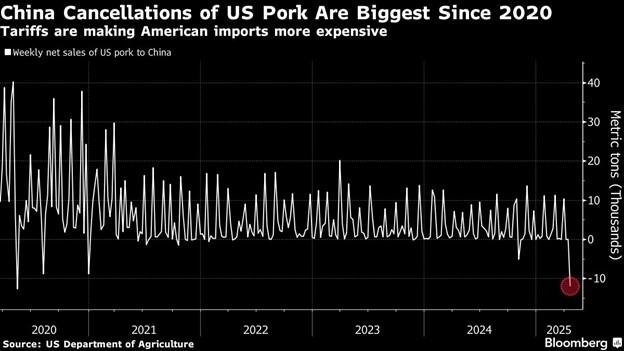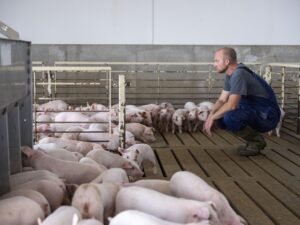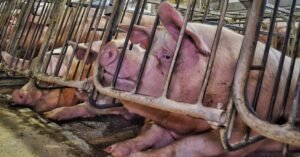Amid Escalating Trade Tensions
In a significant move that’s sending ripples through agricultural markets, China has cancelled substantial orders of American pork amid an intensifying trade war between the world’s two largest economies. Chinese importers withdrew orders for 12,030 metric tonnes of pork last week—marking the largest cancellation since May 2020, during the early months of the COVID-19 pandemic. This action represents a calculated strategic shift to reduce dependency on American farm products.
The cancellation coincides with escalating tariffs that have rendered American pork considerably less competitive in the Chinese marketplace. Following President Trump’s imposition of a 145% tariff on Chinese imports, Beijing responded with retaliatory measures, slapping a 125% tariff on various American goods. These combined pressures have created a punishing 172% tariff on American pork entering the Chinese market. Consequently, Chinese importers are actively seeking alternative suppliers.
Agricultural experts view this development as particularly concerning since China represents the third-largest customer for American pork, with imports valued at approximately $1.1 billion annually. The American pork industry now faces significant challenges as China pivots toward European producers. Reports indicate that Beijing has already secured new agricultural deals with Spain, effectively redirecting business that would typically benefit American farmers.
Economic and Political Implications
The timing couldn’t be worse for American pig farmers. Despite most producers not relying exclusively on Chinese markets for their livelihoods, the sudden loss of such a significant export destination presents considerable financial strain. Dexter Roberts, a senior fellow at the Atlantic Council’s Global China Hub, noted the targeted nature of China’s response: “This is a targeted response from China to hurt parts of the [US] that are red.” This observation highlights the political dimension of the trade conflict, as many American farm states traditionally lean Republican and supported Trump in the recent presidential election.
China’s strategy extends beyond pork. Analysts predict that producers of other agricultural goods will shoulder an even larger burden in this trade war. The Chinese government appears determined to minimize its exposure to U.S. agricultural products broadly as tensions continue to mount.
For American farmers, particularly those in pork-producing regions, the economic consequences could be severe. As Roberts ominously warned, “People are very aware of this and very worried. One bad year and you might be mortgaging the farm.”
Strangely, while President Trump claims to be engaged in trade talks with China, Beijing flatly denies any such discussions are taking place. The contradicting statements further complicate an already contentious relationship between the two nations, making it difficult to predict when or how this trade dispute might be resolved.
Global Market Repercussions
The global pork market is experiencing unprecedented volatility as a result of these developments. China, despite being the world’s largest producer of pork—generating nearly half of the global supply—has traditionally relied on American imports to supplement domestic demand. The United States, as the world’s third-largest pork producer, now faces considerably diminished access to this crucial market.
European producers, particularly those in Spain, are swiftly moving to fill the gap left by American exporters. This geographical shift in trade patterns could persist well beyond the current dispute if Chinese importers establish reliable alternative supply chains.
The cancellation of such a substantial order signals a broader economic strategy by China to diverse its agricultural import portfolio. By reducing dependence on American farm products, Beijing aims to insulate itself from future trade disputes and political leverage attempts. This approach reflects a confident posture from Chinese leadership, which appears willing to absorb short-term supply disruptions for longer-term strategic independence from American agricultural exports.
For American pork producers, the road ahead looks increasingly challenging. With China’s domestic pork production already substantial and its willingness to source from alternative suppliers demonstrated, regaining this crucial export market will require either significant diplomatic breakthroughs or economic concessions that seem unlikely in the current political climate.






